|
|
|
|
| Adam Carr's Election Archive
|
Australian federal election, 2022
Division of Clark, Tasmania
Named for: Andrew Inglis Clark (1848-1907): Tas MP 1878-82,
1887-98, judge. Co-author of the Australian Constitution, co-sponsor
of the Hare-Clark electoral system.
Central Hobart: Claremont, Glenorchy, Hobart, Moonah, New Town
State seats: All of Clark
Local government areas: All of
Glenorchy and
Hobart, parts of
Kingborough
Borders with:
Franklin and
Lyons
Enrolment at 2019 election: 73,915
Enrolment at 2022 election: 74,797 (+01.2)
1999 republic referendum: Yes 52.4
2018 same-sex marriage survey: Yes 73.8
Sitting member: Andrew Wilkie (Independent):
Elected 2010, 2013, 2016, 2019
2007 Labor majority over Liberal: 15.6% *
2010 Independent majority over Labor: 1.2% *
2013 Independent majority over Labor: 15.5% *
2016 Independent majority over Labor: 17.8% *
2019 Independent majority over Labor: 22.1%
* as Denison
Liberal two-party vote 1983-2019
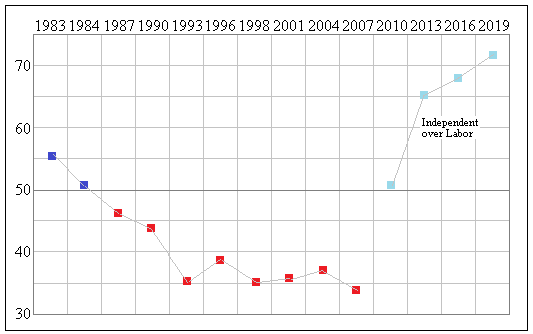
Status: Very safe Independent
Best Independent booths, two-candidate vote: Sandy Bay Beach (84.5), Waimea Heights (82.3), Fern Tree (81.6), Taroona (81.5),
Lower Sandy Bay (81.2)
Best Labor booths, two-candidate vote: Goodwood (41.2), Windermere (37.6), Moonah East (36.8),
Glenorchy Central (36.7), Glenorchy (36.2)
2019 results
Statistics and history
Candidates in ballot-paper order:
 |
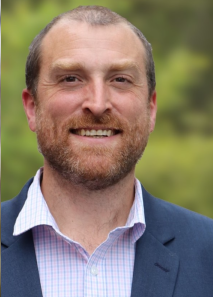 |
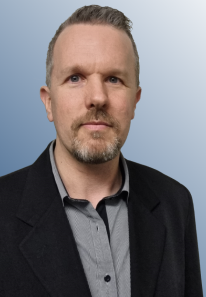 |
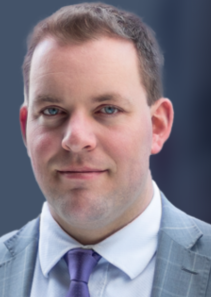 |
1. Michelle Cameron
Pauline Hanson's One Nation |
2. Simon Davis
Australian Labor Party |
3. Ian Ramsden
Liberal Democrats |
4. Will Coats
Liberal Party |
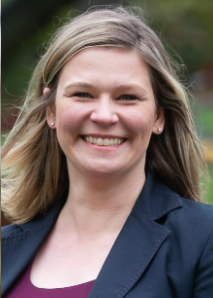 |
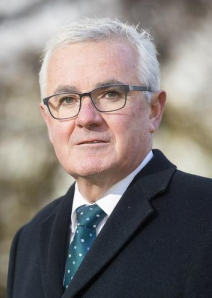 |
 |
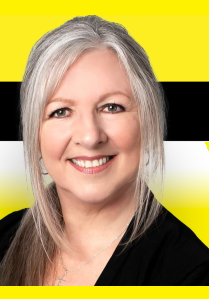 |
5. Janet Shelley
Australian Greens |
6. Andrew Wilkie
Independent |
7. Casey Davies
Animal Justice Party |
8. Sandra Galloway
United Australia Party |
Candidate websites:
Will Coats
Casey Davies
Simon Davis
Sandra Galloway
Ian Ramsden
Janet Shelley
Andrew Wilkie
Division of Clark
The seat of Clark, named
Denison until the 2018 redistribution, has existed since Tasmania was first divided into
electorates in 1903, and has always taken in the city of Hobart and its suburbs on the western shore of the Derwent River.
Its boundaries have expanded and contracted over successive redistributions but the character of the seat has changed
very little. Although it has a relatively low median income level, like all Tasmanian seats, it has a high proportion of
people in professional and managerial occupations, and particularly, as both a state capital and a hub for Commonwealth
administration, a high level of government employment. This contributed to the consolidation of the Labor vote from 1969
onwards, even as traditional blue-collar employment has disappeared from inner urban areas. Clark has the smallest
proportion of Catholics of any seat in Australia.
Members for Denison included Liberal ministers
Athol Townley and
Michael Hodgman.
Duncan Kerr won the seat for Labor
in 1987. Denison used to be one of the most consistently marginal seats in the country (it has had 16 members, second only
to the "ejector seat,"
Bass), but Kerr held it for 23 years. He was a junior minister in the Keating government and a
Parliamentary Secretary in the Rudd Government. Kerr retired in 2010, and Denison then produced a major upset by electing
Andrew Wilkie, an independent.
Andrew Wilkie, independent MP for Denison from 2010 to 2019 and for Clark since 2019, is a former Army officer and analyst
at the Office of National Assessments, who gained attention with his criticisms of the Howard Government's conduct of the
Iraq War. In 2004 he ran as an independent against
John Howard in
Bennelong. In 2007 he was in second place on the Greens'
Tasmanian Senate ticket. In 2010 he contested Denison as an independent. He polled only 21%, but was elected over Labor
on Green and Liberal preferences.
Wilkie supported the minority Gillard Government in the 2010 hung parliament, but later withdrew his support. He
easily won re-election in 2013, 2016 and 2019. In 2019 he won every booth, most by wide margins.
He now appears to be unbeatable in this seat. The Labor candidate is Simon Davis, an organiser of the United Workers Union.
The Greens candidate is Janet Shelley, an environment officer at the Bureau of Meterology in Melbourne.
Demographics:
Median weekly household income: $1,224 (Australia $1,438)
People over 65: 17.4% (Australia 15.8%)
Indigenous: 3.0% (Australia 2.8%)
Australian born: 75.3% (Australia 66.7%)
Non-English-speaking households: 12.8% (Australia 22.2%)
Catholics 9.8% (Australia 22.6%)
No religion 41.5% (Australia 29.6%)
University graduates: 26.8% (Australia 22.0%)
Professional and managerial employment: 38.3% (Australia 35.2%)
Employed in manufacturing and construction: 16.9% (Australia 22.9%)
Paying a mortgage: 31.1% (Australia 34.5%)
Renting: 33.6% (Australia 30.9%)
Traditional families: 24.4% (Australia 32.8%)
Back to main page
|
|















